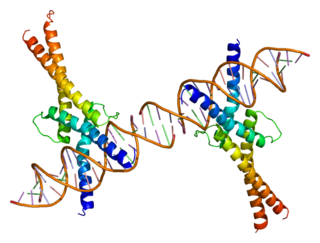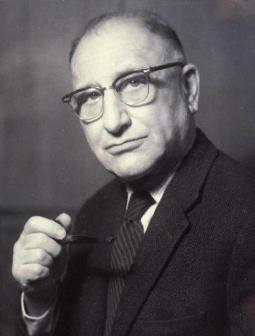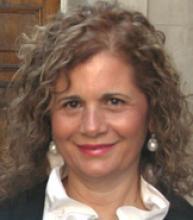Related Research Articles

Lipolysis is the metabolic pathway through which lipid triglycerides are hydrolyzed into a glycerol and free fatty acids. It is used to mobilize stored energy during fasting or exercise, and usually occurs in fat adipocytes. The most important regulatory hormone in lipolysis is insulin; lipolysis can only occur when insulin action falls to low levels, as occurs during fasting. Other hormones that affect lipolysis include leptin, glucagon, epinephrine, norepinephrine, growth hormone, atrial natriuretic peptide, brain natriuretic peptide, and cortisol.

Fatty liver disease (FLD), also known as hepatic steatosis and steatotic liver disease (SLD), is a condition where excess fat builds up in the liver. Often there are no or few symptoms. Occasionally there may be tiredness or pain in the upper right side of the abdomen. Complications may include cirrhosis, liver cancer, and esophageal varices.

Perilipin, also known as lipid droplet-associated protein, perilipin 1, or PLIN, is a protein that, in humans, is encoded by the PLIN gene. The perilipins are a family of proteins that associate with the surface of lipid droplets. Phosphorylation of perilipin is essential for the mobilization of fats in adipose tissue.
Intramuscular fat is located inside skeletal muscle fibers. It is stored in lipid droplets that exist in close proximity to the mitochondria, where it serves as an energy store that can be used during exercise. In humans, excess accumulation of intramuscular fat has been associated with conditions such as insulin resistance and type 2 diabetes. The human immunodeficiency virus (HIV)-lipodystrophy syndrome is associated with over-accumulation of intramuscular fat, which may contribute to AIDS wasting syndrome.

Dame Sheila Patricia Violet Sherlock DBE, FRCP FRCPE FRS HFRSE FMGA FCRGA was a British physician and medical educator who is considered the major 20th-century contributor to the field of hepatology.

Peroxisome proliferator-activated receptor gamma, also known as the glitazone reverse insulin resistance receptor, or NR1C3 is a type II nuclear receptor functioning as a transcription factor that in humans is encoded by the PPARG gene.

Phosphatidylethanolamine N-methyltransferase is a transferase enzyme which converts phosphatidylethanolamine (PE) to phosphatidylcholine (PC) in the liver. In humans it is encoded by the PEMT gene within the Smith–Magenis syndrome region on chromosome 17.

Sterol regulatory element-binding transcription factor 1 (SREBF1) also known as sterol regulatory element-binding protein 1 (SREBP-1) is a protein that in humans is encoded by the SREBF1 gene.

Adipose differentiation-related protein, also known as perilipin 2, ADRP or adipophilin, is a protein which belongs to the perilipin (PAT) family of cytoplasmic lipid droplet (CLD)–binding proteins. In humans it is encoded by the ADFP gene. This protein surrounds the lipid droplet along with phospholipids and is involved in assisting the storage of neutral lipids within the lipid droplets.
Congenital generalized lipodystrophy is an extremely rare autosomal recessive condition, characterized by an extreme scarcity of fat in the subcutaneous tissues. It is a type of lipodystrophy disorder where the magnitude of fat loss determines the severity of metabolic complications. Only 250 cases of the condition have been reported, and it is estimated that it occurs in 1 in 10 million people worldwide.

Hans Popper was an Austrian-born pathologist, hepatologist and teacher. Together with Dame Sheila Sherlock, he is widely regarded as the founding father of hepatology. He is the namesake of the Hans Popper Hepatopathology Society, as well as the International Hans Popper Award and the Hans Popper Hepatopathology Society.

Gökhan S. Hotamisligil is a Turkish-American physician scientist; James Stevens Simmons Chair of Genetics and Metabolism at Harvard T.H. Chan School of Public Health (HSPH); Director of the Sabri Ülker Center for Metabolic Research and associate member of Harvard-MIT Broad Institute, Harvard Stem Cell Institute and the Joslin Diabetes Center.

Perilipin 5, also known as Oxpatperilipin 5 or PLIN5, is a protein that belongs to perilipin family. This protein group has been shown to be responsible for lipid droplet's biogenesis, structure and degradation. In particular, Perilipin 5 is a lipid droplet-associated protein whose function is to keep the balance between lipolysis and lipogenesis, as well as maintaining lipid droplet homeostasis. For example, in oxidative tissues, muscular tissues and cardiac tissues, PLIN5 promotes association between lipid droplets and mitochondria.

Jean Elise Schaffer is an American physician-scientist. She is a Senior Investigator at the Joslin Diabetes Center, where she also serves as Associate Research Director, and she is Professor of Medicine at Harvard Medical School. Her work focuses on fundamental mechanisms of metabolic stress responses and the pathophysiology of diabetes complications.

Patrizia Farci is an Italian scientist and hepatologist. She is chief of the hepatic pathogenesis section at the National Institute of Allergy and Infectious Diseases. Farci conducts translational research in the field of liver diseases, particularly in the study of pathogenesis of acute and chronic viral hepatitis. She was previously a full professor of medicine and director of the liver unit and the postgraduate school of gastroenterology at the University of Cagliari.

Melissa Palmer is an American hepatologist. She is recognized for her research and treatment of hepatitis and liver disease. Palmer is the Chief Medical Officer of Gannex Pharma, a wholly owned company of Ascletis Pharma.
Lorena Alarcon-Casas Wright is a physician (endocrinologist) and an Associate Professor at the University of Washington School of Medicine who serves as the Clinical Director of the LatinX Diabetes Clinic at UW Medicine's Diabetes Institute. Wright specializes in Metabolism, Endocrinology, and Nutrition at the UW Medical Center, Harborview Medical Center, and the UW Diabetes Institute Clinic.
Robert V. Farese, Jr., is an American physician-scientist and professor of Cell Biology at the Sloan Kettering Institute of Memorial Sloan Kettering. He is an internationally recognized leader in the study of cellular lipid metabolism and has made seminal contributions to our understanding of energy storage as triglycerides in cellular organelles called lipid droplets.
Eleftheria Maratos-Flier is an American endocrinologist, and emerita Professor of Medicine at Harvard Medical School, best known for her expertise in the pathophysiology and prevention of obesity-related metabolic disorders, and for her discoveries on the neuroendocrine control of feeding behaviour. She is a contributing author to known textbooks and reviews in internal medicine, endocrinology, and physiology. Her marriage with professor Jeffrey Flier, was noted by Forbes as a lasting and productive bond between eminent medical scholars. They have two adult daughters who are also physicians. She is also known as Terry Maratos-Flier.
Nimer Assy is an Israeli hepatologist and academic focusing on internal medicine and liver transplantation. He is a professor at the Bar-Ilan University Azrieli Medical School and the Department Head of the Clinical Research Unit within Internal Medicine Ward A of the Galilee Medical Center.
References
- 1 2 3 4 5 6 7 Carr, Rotonya M. (2022-10-01). "DDS Profile: Rotonya M. Carr, MD, FACP". Digestive Diseases and Sciences . 67 (10): 4612–4615. doi:10.1007/s10620-022-07627-0. ISSN 1573-2568. PMC 9362335 . PMID 35908124.
- 1 2 3 4 5 6 7 8 "Rotonya M. Carr, MD | UW Division of Gastroenterology". University of Washington. Retrieved 2023-04-16.
- 1 2 Hanna, Maddie (2018-02-27). "Nominees for Phila.'s new school board". The Philadelphia Inquirer. pp. A03. Retrieved 2023-04-16– via Newspapers.com.
- ↑ Carr, Rotonya M. (2020-11-02). "Reflections of a Black woman physician-scientist". The Journal of Clinical Investigation . 130 (11): 5624–5625. doi:10.1172/JCI144525. ISSN 0021-9738. PMC 7598078 . PMID 32970630.
- ↑ "New Faculty Spotlight: Welcome Rotonya M. Carr". UW Research. Retrieved 2023-04-16.
- ↑ Laughlin, Jason (2021-06-27). "Doctors of color reach out in PSAs". The Philadelphia Inquirer. pp. B1. Retrieved 2023-04-16– via Newspapers.com.